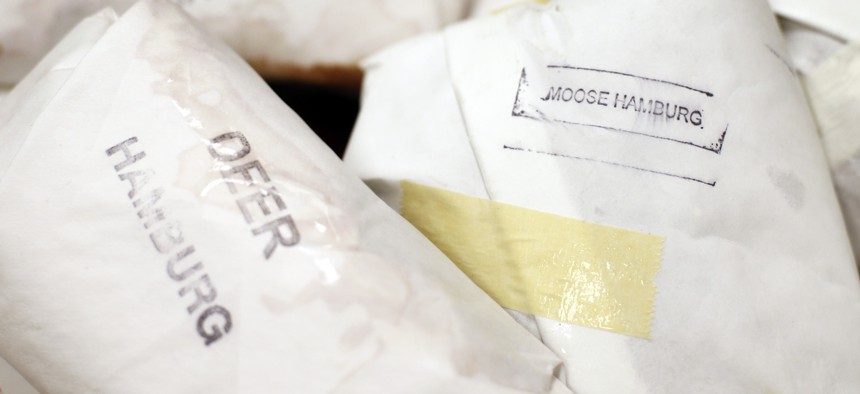On the Hunt for Lean Protein, Food Pantries Turn to Hunters

Packages of butchered deer and moose meat are prepared to be added to a meal being cooked to feed the homeless in Portland, Maine. AP Photo
Across the country, hunters donate thousands of pounds of game meat to help stock food pantries in their communities.
Thousands of hungry families across the country will feast on game meat this fall. Most of them won’t be hunters.
The meat—mostly venison, with some moose and bear—will be doled out by food pantries after being donated by hunters who participate in various state programs. The details differ, and so do the names (there’s Farmers and Hunters Feeding the Hungry, Sportsmen Against Hunger, and Hunters For The Hungry, to name a few) but the premise is largely the same: hunters donate meat without having to pay processing fees, giving food pantries a much-needed source of nutrition for their clients.
“It’s a very important item for us because it’s a healthy, lean protein, and protein isn’t something that food banks get donated a lot,” said Celia Cole, CEO of Feeding Texas, a statewide organization that represents all 21 food banks in Texas. “A lot of our donations are in the form of canned and dried goods. Dairy, produce and protein are in high demand from the people we serve and are not readily available, which is why this is such an important program for us.”
The Texas Hunters for the Hungry program is funded, in part, through voluntary, tax-deductible contributions, including those given by hunters when they register for their hunting or fishing licenses. The state Parks and Wildlife agency contracts with Feeding Texas to funnel those donations to meat processors, who process the meat at no cost to the hunter and then ship it to food banks for distribution.
“The idea is to make it easier for hunters to contribute to the program without it costing them anything, and to encourage processors to participate by offsetting the cost for them as well,” Cole said.
In Michigan, the program—Sportsmen Against Hunger—works largely the same way, partnering with the state to ask hunters and fishermen to donate $1 during the licensing process. Those proceeds go to certain meat processors, which grind the venison into burgers and ship it off to food distributors.
The organization also spends a fair amount of time on outreach, making sure that hunters understand the need for meat products to help feed hungry Michiganders.
“We educate the hunting public and let them know exactly why we’re here,” said Dean Hall, executive director of Michigan Sportsmen Against Hunger. “There’s a strong need for meat, which is something that usually has to be purchased for food banks, shelters and food pantries. It’s at a very high cost and it’s not practical for them to spend their funds on purchasing meat.”
In other states, like Maine, the program is a bit broader. Hunters there can donate venison, but also moose and bear. The state also accepts fish (sharks and bottom feeders, mostly), and will also take roadkill, though venison makes up most of the donations, said Don Morrison, operations manager for Wayside Food Programs, a Portland-based nonprofit that oversees a host of anti-hunger initiatives. The organization both distributes the meat and cooks it up for hungry patrons at several food pantries.
“We do a lot with it in the kitchen. We generally will mix it with beef, because it’s super lean and very, very dry, and most people just aren’t used to that when we’re eating,” he said. “We’ll do meatballs, we’ll do lasagna, we’ll do sloppy joes.”

Hunters who know about the program are typically happy to participate, for varying reasons, Morrison said. Some are trophy hunters, more interested in antlers than meat. The free tagging and processing is a draw for others who end up successfully hunting multiple deer over the course of a season.
“Some of the hunters really enjoy hunting, but once their freezer is full, they don’t want to shoot an animal just to kill it,” he said. “So if they know it’s an option to donate it, they will.”
It’s difficult to know how much meat is donated nationwide, though some states have local estimates. In Maine so far this year, hunters have forked over at least 5,000 pounds of meat. And last year in Texas, Hunters for the Hungry distributed 105,179 pounds of venison. It’s a popular program, Morrison said, because it makes sense—states are capitalizing on something that large swaths of the population are apt to do anyway.
“I come from a hunting family and I grew up in a rural area where we ate a lot of wild game, so this is, to me, a very obvious solution to the problem,” Morrison said. “I think it’s an untapped resource.”
Kate Elizabeth Queram is a Staff Correspondent for Route Fifty and is based in Washington, D.C.
NEXT STORY: Enlisting Truckers to Fight Human Trafficking





